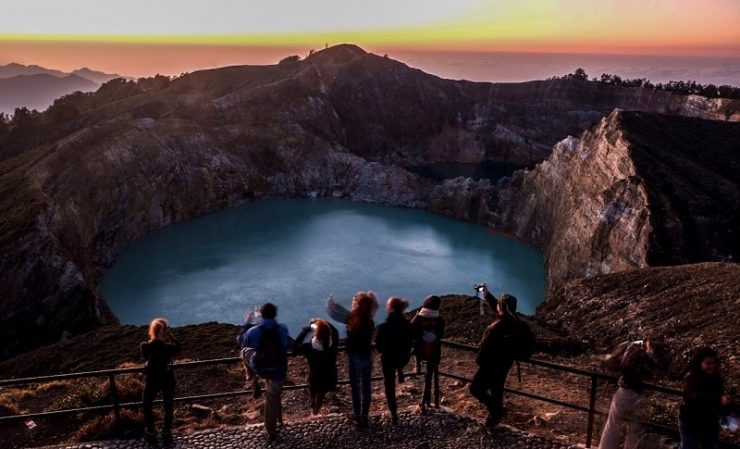SEVERAL tourist resorts and parks in the Lagoi integrated and exclusive tourist area on Bintan Island, Riau Islands Province, have ceased operations following the spread of coronavirus (COVID-19) in China and 28 other countries.
Since January 23, 2020, the number of Chinese tourists on the island fell 100 percent after their government issued a travel advisory to the citizens over the coronavirus.
Not only in Bintan, but thousands of foreign tourists, mostly Chinese, canceled room reservations in and flight to Bali, North Sulawesi, and others, over the coronavirus outbreak, although Indonesia has, so far, remained free from coronavirus cases.
In fact, tourism industry around the globe has been hit hard by the coronavirus outbreak originating in Wuhan, Hubei Province, China.
Official figures indicated that Chinese visitors accounted for 150 million overseas trips in 2019, while Chinese tourists spent $130 billion overseas in 2018, up 13 percent from the previous year, according to data of the China Tourism Academy.
Indonesia received 1.97 million Chinese tourists in 2017, and the figure increased to 2.7 million Chinese tourists in 2018. The Tourism Ministry had set a target to attract 3.5 million Chinese last year, but the realization reached 2.07 million owing to natural disasters and the impacts of the US-China trade war.
The Indonesian Tourism Ministry has forecast that the current onslaught of the coronavirus may inflict potential losses of US$2.8 billion on Indonesia’s tourism.
“The calculation is not as simple as what we will do after everything is over. However, as we all know, the number of Chinese tourists (visiting Indonesia) reaches two million, or equivalent to US$2.8 billion in foreign exchange earnings. Hence, the loss will depend on how long the virus outbreak will last,” Tourism and Creative Economy Minister Wishnutama Kusubandio stated recently.
The Indonesian government has set a target of foreign exchange earnings from the tourism sector for 2020 at US$21 billion, or US$1 billion higher than US$20 billion in 2019.
China topped the list of sources of tourist arrivals in Indonesia, with an estimated two million tourists and total spending of US$14 thousand per tourist, according to the Ministry.
Other nations face a similar grim reality. The damage caused to Vietnam’s tourism sector over the coronavirus infection will range between $5.9 billion and $7.7 billion, according to the Vietnam National Administration of Tourism estimates.
In Thailand, the drop in Chinese tourist numbers from January to April alone could cost the Thai economy $3.05 billion, according to The Tourism Authority of Thailand.
To prevent the collapse of the country’s tourism industry, the Indonesian government will boost domestic tourism by encouraging national tourists to travel domestically and offering discounts on domestic flight fares.
“Discounts on flight fares can increase domestic tourism,” Tourism Minister Kusubandio stated.
In accordance with the president’s instruction, the government will offer discounts on flights to Bali, Sulawesi, and Riau Islands, he remarked.
Bali, Sulawesi, and Riau Islands were the three tourism destinations that witnessed a decline in tourist visits, as the government has suspended all flights from and to China owing to the coronavirus outbreak.
Wishnutama has also coordinated with some airlines and Minister of Transportation Budi Karya Sumadi for diverting routes or increasing the frequency of flight routes to Indonesia from other countries apart from China.
Furthermore, Transportation Minister Budi Karya Sumadi divulged that the government will offer direct subsidy to domestic airlines whose businesses were impacted by the coronavirus outbreak.
“The government will subsidize (them). Mrs. Sri Mulyani (the minister of finance) has agreed, and it will be announced later that the government will offer subsidies, perhaps directly to the airline operators, maybe (those serving flight routes) to tourist destinations,” Sumadi remarked.
The minister called on airports and airlines to offer discounts to passengers in a bid to drive domestic tourism.
“This will help to ensure that our enthusiasm to fill the gaps left by Chinese tourists is materialized,” he stated.
He admitted that qualitatively, the temporary suspension of all flights to and from China had a negative impact on the aviation industry in Indonesia.
However, he believed that the issue would soon be resolved, with direct subsidies from the government expected to be effective within a day or two.
Earlier, on Feb 5, 2020, the government had suspended indefinitely all flights to China, excluding Hong Kong and Macau, over the coronavirus outbreak.
In the meantime, Vice President Ma’ruf Amin recently highlighted the efforts or innovations to be made, including developing strategies to boost the number of domestic tourists as the backbone of the hotel industry.
He encouraged the Indonesian Hotel and Restaurant Association (PHRI) and tourism sector stakeholders to continue to innovate in addressing the decline in foreign tourist arrivals, for instance by organizing conventions, activities, or attractions that are of interest to the public, governmental, non-governmental, and business entities, as well as the community.
The efforts to boost domestic tourists have been lauded by PHRI chairperson Hariyadi Sukamdani.
A PHRI program of Wonderful Indonesia Visit (ViWI) dubbed “Nusantara Shocking Deal 2020” has been initiated to boost national tourism this year, he revealed.
With a population of over 265 million and having been free from the coronavirus so far, Indonesia is quite upbeat of its tourism industry depending on domestic tourists.
The number of domestic tourist trips in 2018 had reached 303.4 million, an increase from 270 million trips in 2017.In 2018, the spending of Indonesian domestic tourists was recorded at Rp291.02 trillion, up 17.89 percent, from Rp253.45 trillion in 2017. [antaranews/photo special]
















